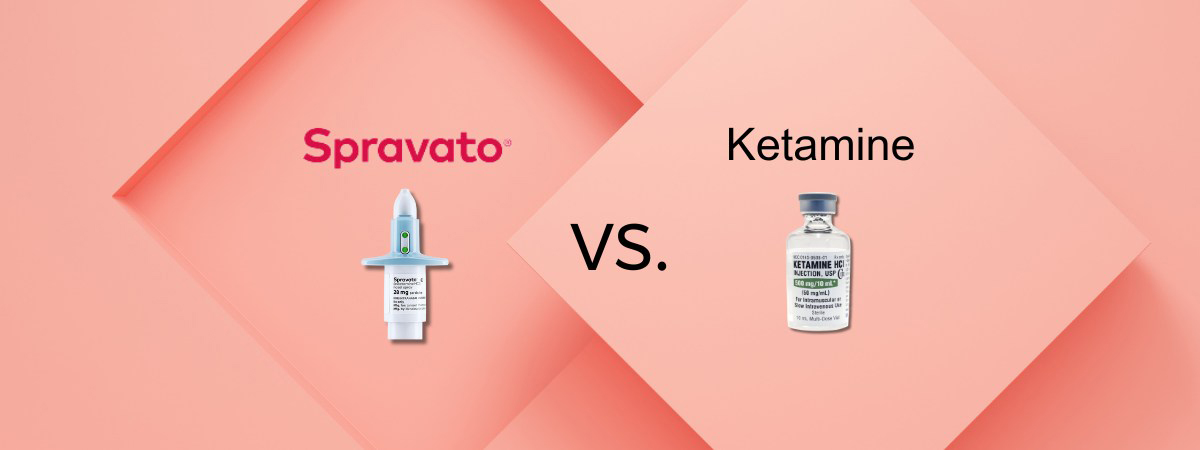
What's The Difference Between Spravato And Ketamine?
You may have read about SPRAVATO, the first breakthrough depression medicine in over 20 years. Designed exclusively for Treatment-Resistant Depression (TRD), Spravato targets certain neural pathways to enhance mood regulation. Spravato is the name brand for esketamine, commonly mistaken for ketamine, an anesthetic drug. The two medications are similar, but there are some important differences between Spravato and ketamine.
What is Spravato (esketamine)?
Spravato is a trailblazing new drug that works in a different fashion than conventional antidepressants. The medication comes in the form of a self-administered nasal spray and helps the brain send messages more productively. By engaging certain receptors, you can govern mood better and lessen harmful symptoms of depression. The effect on mood can be immediate, especially for those suffering from Treatment-Resistant Depression.
The active ingredient in Spravato is esketamine, a ketamine derivative. Even though ketamine and Spravato are chemically similar, they affect the body in different ways. Ketamine is used as an anesthetic, while esketamine acts on different neural receptors to enhance neuroplasticity. Considering there is a chance of experiencing side effects like sedation, Spravato is always given under the direction of a recognized healthcare provider, like The Counseling Center in Clark.
Esketamine is recognized for its quick impact, with results frequently observed as soon as 1-2 days after the opening dose. Clinical studies show that treatment benefits are realized at the end of the induction period (4 weeks). Individuals using Spravato have enjoyed:
• Mood regulation
• Improved productivity
• More interest in social activities
Spravato is not intended to replace your current antidepressant medication but is taken with your oral antidepressant.
What Is Ketamine?
Ketamine is typically utilized as a short-duration anesthetic and given intravenously. The FDA has not authorized ketamine as a depression treatment. Ketamine also has emerged as a "club drug" that has become popular among teenagers and young adults. Taken as a powder or liquid, ketamine can give users feelings of euphoria and dissociation from reality. For more information on ketamine addiction, please call us at 732-605-6029.
What Is The Difference Between Spravato and Ketamine?
Common Questions Regarding Spravato vs. Ketamine
Will Spravato nasal spray reduce pain like ketamine?
Spravato is not intended to treat pain, and pain relief is not one of the drug's side effects. Ketamine is utilized as a surgical and veterinary anesthetic.
Can I use Spravato independently?
Right now, Spravato is only accessible through authorized healthcare practitioners in light of dissociation and sedation side effects and the potential for misuse or abuse.
What is Treatment-Resistant Depression (TRD)?
Spravato is only available for those with Treatment-Resistant Depression. You may have TRD if:
- You've received treatment for a severe depressive disorder
- You’ve tried a minimum of two antidepressant medicines
- You have not responded to treatment
Millions of individuals globally are diagnosed with a major depressive disorder, and approximately 30% of those encounter TRD.
What is Spravato treatment like?
First and foremost, if you think Spravato could benefit you, you require a clinical assessment to determine if the medication is suitable. During every appointment, you'll get your core vital signs checked and self-administer the nasal spray treatment. Every Spravato session can take up to two hours so professionals can watch for side effects. A quick evaluation is completed at the finish of each appointment to document progress. Because of safety matters, the drug will only be available through a REMS-certified Spravato Treatment Center like The Counseling Center in Clark. It is also advised that you attend consistent therapy sessions while on Spravato.
Want To Know More About Spravato?
Consult with the Counseling Center to find out if Spravato is appropriate for you. Talk with a trained professional by calling 732-605-6029 or completing the form below. We're standing by for you at all hours, seven days a week.
-1.jpg?t=1663075584)
